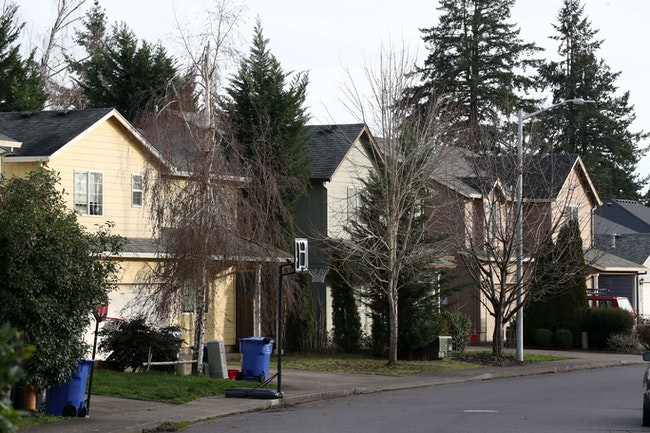
Homes on Tierra Drives Northeast on Jan. 12. (Amanda Loman/Salem Reporter)
Salem area leaders need to provide incentives for building and offering units below market rates and speed up the process for development to help fill the area’s housing gap, local developers told city and county officials at a work session last week on housing needs in Salem.
Developers at the virtual, city-hosted meeting April 18 said building affordable housing is made difficult by rising construction costs, the low profit compared to market rates, and delays in getting project applications approved and obtaining grants.
The work session was intended to help local leaders better understand how affordable housing is paid for, issues driving the region’s affordable housing crisis and what is needed to change the trajectory.
Marion and Polk county commissioners and board members from the Salem Area Mass Transit District and Salem-Keizer School District also attended. Following the session, Mayor Chuck Bennett told Salem Reporter the concerns and suggestions developers shared at the meeting will help inform city officials’ plans as they discuss proposals for future housing projects.
The discussion also came as the city is continuing to develop its comprehensive plan, the “Our Salem,” project, which will help guide land development in the future as Salem is expected to see tens of thousands of new residents in less than two decades. The draft plan, which was presented in October to Salem’s city council and planning commission, includes zoning changes that would ensure affordable housing is near adequate transportation. The revised plan will go through public hearings, and Bennett said he expects it will be done this year.
Mike Erdmann, CEO of the Home Builders Association of Marion and Polk Counties, said during the work session it is “virtually impossible” for market rate home builders to build new homes that are affordable for the vast majority of residents.
In the Salem area, he said there is no new construction on the market for under $440,000. A family of four with a median income of $70,000 can only afford to buy a $300,000 home with a 10% down payment.
“There’s a big, big gap in affordability on new construction,” he said.
Erdmann said building new homes speeds up a process he called “filtering,” where the wealthiest buyers move into higher-income housing. People earning slightly less can then buy the homes they vacated, prompting middle-class buyers and those in the least expensive apartments to follow suit.
In reverse, he said, not producing enough new Salem area housing in recent years has “intensified competition” across the market, pushing up rent and home prices.
“Those that have more than enough means vie with people of lesser means for the same homes or apartments, and that’s a battle that those with the lowest incomes are always going to lose,” he said.
Erdmann encouraged policymakers to speed up the “unreasonably long” approval process for development applications, and to work with developers to try to get homes built as quickly as possible.
Traci Manning, executive director of Portland-based affordable housing developer Housing Development Center, said people who primarily build market-rate housing have little incentive to add affordable units, “not because they’re bad people, but just because it substantially increases the degree of difficulty for them to build their housing.”
Manning said added incentives are needed for developers to build mixed-income housing. “You say, ‘We’ve got money or tax breaks or some land available, and here’s what we need to see in order to do that,’” she said.
Neighborly Ventures, a Salem-based development company that builds housing in Oregon, Washington, Idaho and Utah, has developed about 1,300 apartment units in the Salem area since around 2015. Of those, around 500 were considered affordable housing, said Richard Berger, senior director of development. “I’ve found just personally in trying to make affordable housing work, it takes about twice as much work and you make us about a quarter of the profit as a market rate project,” he said at the work session.
Berger said affordable housing requires unique funding, and the process of obtaining state and federal funds is cumbersome. “Any way you guys at the local level can support housing and support affordable housing is just simpler,” he said.
Berger said timing on housing projects also matters, especially considering the rainfall Salem gets. He said the difference between starting in mid-September versus October “can be gigantic.”
“You think, ‘Oh it’s just a month.’ But it just becomes a wet muck, and you’re basically waiting ‘till spring to get going,” he said. “If you can get going in August and get going in September, a project can happen. Otherwise, you wait a year.”
In response to a question from Marion County Commissioner Kevin Cameron about building affordable housing in the area near Front Street, Interim City Manager Kristin Retherford said city officials are having conversations with property owners there about offering tax breaks to secure a portion of the units for affordable housing. She said the arrangement would replicate the Urban Renewal Agency’s agreement with MWIC Jory, LLC, to develop and maintain 36 units for people earning an average of 60% of the median area’s income at Jory Apartments in northeast Salem.
Contact reporter Ardeshir Tabrizian: [email protected] or 503-929-3053.
JUST THE FACTS, FOR SALEM – We report on your community with care and depth, fairness and accuracy. Get local news that matters to you. Subscribe to Salem Reporter starting at $5 a month. Click I want to subscribe!









